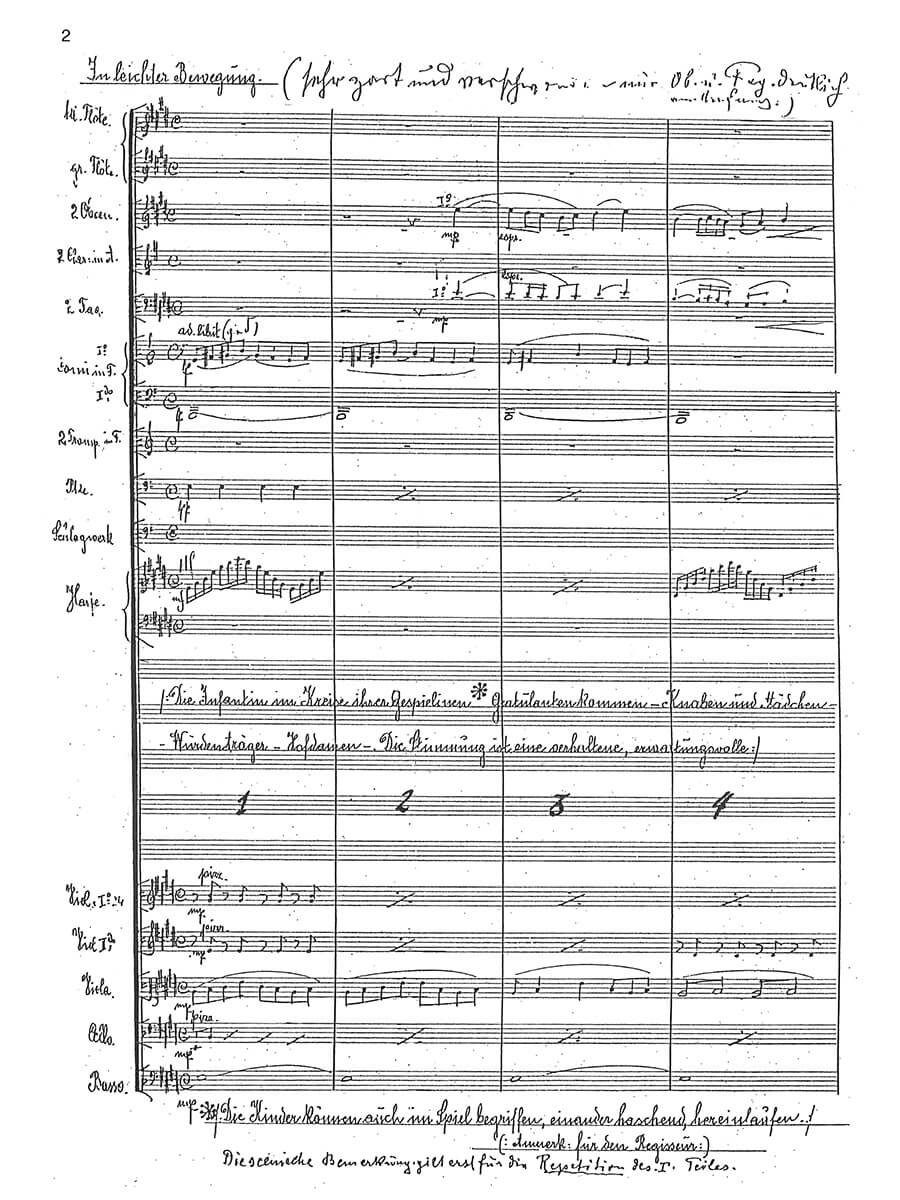Der Geburtstag der Infantin (Version 1908), Pantomime for Chamber Orchestra
Schreker, Franz
36,00 €
Franz August Julius Schreker – The Birthday of the Infanta
(b. Monaco, March 23, 1878 – d. Berlin March 21, 1934)
Pantomime after the Fairytale by Oscar Wilde for Chamber Orchestra
(Original 1908 Version)
I. Die Infantin im Kreise ihrer Gespielinnen p.2
II. Aufzug und Gratulation der Knaben p.16
III. Der Stierkampf p.22
IV. Die Infantin (Einlage) p.30a
V. Die Marionetten p.31
VI. Menuett der Tänzerknaben p.37
VII. Auftritt des Zwerges
Die drei Tänze des Zwerges:
VIII. Mit dem Frühling im Wind p.49
IX. Der Tanz in blauen Sandalen über das Korn p.73
X. Der Tanz in roten Gewand im Herbst p.85
XI. Die Rose p.99
XII. Der Spiegel/Das Ende des Zwerges p.115
Preface (by Christopher Little, 2018)
It is ironic that Franz Schreker, composer of scandalously successful operas in both pre-war Vienna and interwar Berlin, achieved his breakthrough success with a ballet. After a promising early start, with Vienna premieres of choral and orchestral works such as the Symphonic Overture to Ekkehard, an Intermezzo for strings, and a setting of Psalm 116 during the 1902-1903 concert season, Schreker’s career ground to halt and by 1906 his name was no longer appearing on concert programs. Schreker turned instead to conducting to support himself. Yet it was just after he became music director of the newly formed Philharmonic Choir in the spring of 1908 that an unexpected opportunity arrived.
This opportunity was a commission for a prestigious Kunstschau organized by a group of artists centered on the painter Gustav Klimt (1862-1918). The show, to take place during the summer of 1908, was to be not only their first combined show in five years, but also a showcase for the newest artistic avant-garde after Klimt and his circle had left the Vienna Secession movement in 1905. As such, not only paintings, but also sculpture, formal gardens, musical concerts, plays, and pantomime shows in an outdoor theater were on offer. The most important theatrical work was to be Schreker’s commission, The Birthday of the Infanta, a ballet pantomime inspired by the eponymous short story by Oscar Wilde (1854-1900).
The Birthday of the Infanta tells the tragedy of a dwarf presented as a plaything to the Infanta (Princess) at the Spanish court. Found alone in the forest, the dwarf has known only the friendship of animals. Confused by the sophistication of the court, he dances for the assembled nobles and accepts a rose from the Infanta. Not understanding the mockery behind the gesture – the dwarf is ignorant of his own ugliness, and takes the laughter and smiles provoked by his appearance innocently – feelings of love transport him. After the Infanta has retired, he discovers a mirror that reveals his own misshapen form for the first time. Destroyed by the knowledge the Infanta merely toyed with him, he dies as the court looks on. The Infanta, after being told the dwarf’s broken heart killed him, responds only, “For the future let those who come to play with me have no hearts.”
The sisters Grete and Elsa Weisenthal danced the parts of the dwarf and Infanta, respectively. Former members of the Vienna Court Opera ballet corps, the two had left to explore new styles of dance and expressive movement pioneered by Isadora Duncan (1878-1927). Not only did Schreker’s Kunstschau commission originate from them, the Weisenthals went on to commission a range of works from Schreker, including Rokoko (1908), Der Wind (1909), Pans Tänze (1909), and Weißer Tanz (1910). …
Read full preface > HERE
| Score No. | 3093 |
|---|---|
| Edition | Repertoire Explorer |
| Genre | Orchestra |
| Size | |
| Printing | Reprint |
| Pages | 164 |
